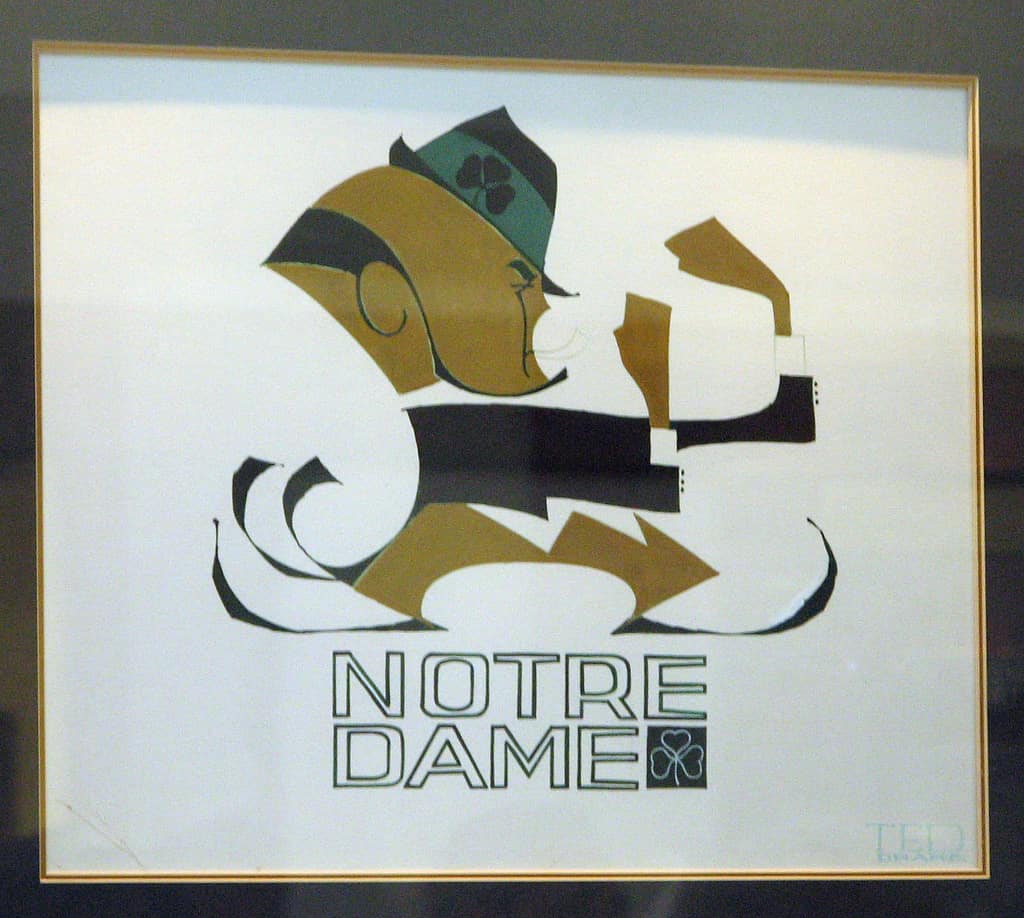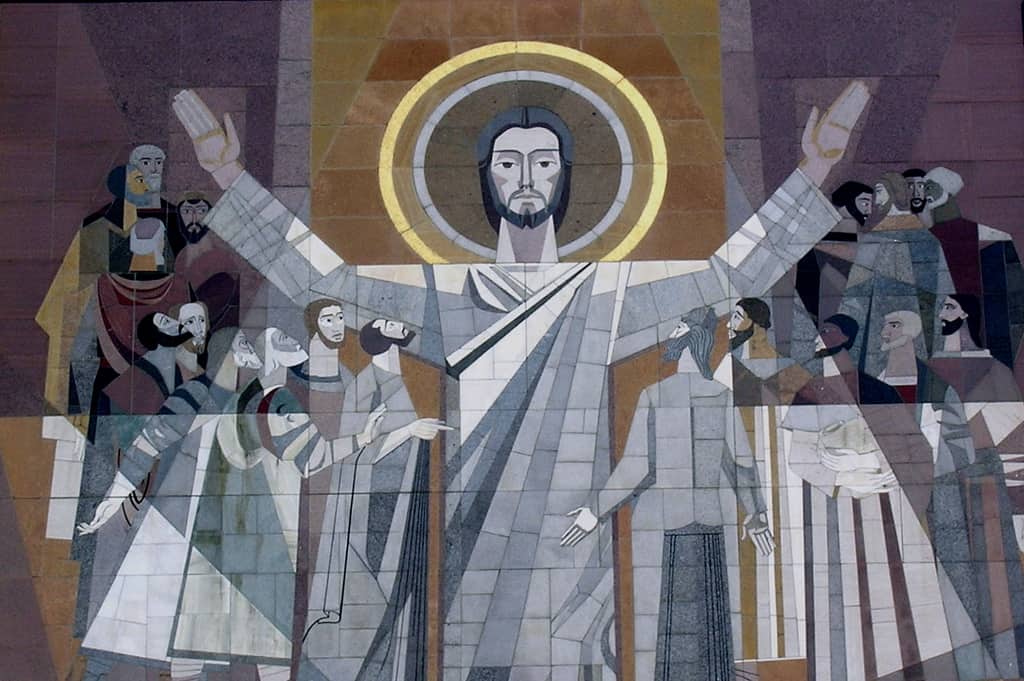Today is the octave of my alma mater’s (crushing) defeat at the gloved hands and curled biceps and steely jaws of the Alabama Crimson Tide football team. Which means I’ve had eight days to soak myself in the gall of an all-but-undefeated football season.1 Which brings up some questions:
What does it mean? Does it mean that Notre Dame is now pretty much just like everybody else? Should anybody without ND ties care? Is a football game even worth talking about?
Before I get at these questions grant me one major caveat. We Notre Dame people talk about Notre Dame. A lot. And I’d apologize for adding my cowbell to the clamor but for two things: (1) I actually love to talk about Notre Dame, and (2) my Jesuit-educated Jesuit editor of The Jesuit Post suggested I write about Notre Dame. I swear he Jesu-put me up to this (although I’ll grant that it didn’t take much convincing on his part).
Actually make that three things, because (3) there are a lot of people who have no actual connection to the place talk about Notre Dame an awful lot, whether because of its success – or lack thereof – on the gridiron, or for its choice of commencement speakers. Or four things, because, (4) after giving it some consideration, I think there’s something about the Notre Dame story that is relevant to the 99.99% of humanity that aren’t alumi/ae.
***
Flashback: the day of my graduation. Setting: Notre Dame stadium, more particularly, a men’s bathroom. Enter my brother, who finds two bathroom occupants in conversation.
Guy 1: “Did you hear about that Rossmann guy?”
Guy 2: “The one who’s giving the speech today?”
Guy 1: “Yeah, that one. Did you know he’s joining the Jesuits?”
Guy 2: “What? That’s like training with the Cubs’ farm team and then signing with the Yankees.”
(End scene)
I laughed – partially to cover my wince – when my brother recounted the scene later that evening, because, while my decision to enter the Society of Jesus resulted from a deep sense of calling to the Jesuits (rather than a decision against the Congregation of Holy Cross – the order that founded Notre Dame – or my home diocese), it’s a fair question to ask how I ended up a Jesuit after studying at Notre Dame. It’s even more fair to ask how I ended up a Jesuit when I grew up in eastern Iowa, a place where there are no Jesuits,2 and that I’d never attended a Jesuit school before becoming a Jesuit.3
The odd thing is this: I can’t answer for the oddity of being a Jesuit who comes from Iowa via Notre Dame without talking about how great Notre Dame is (I promise, this is coming back around to those earlier question). What I mean is, I have to tell the Notre Dame story to tell my own.
So here’s my version of the Notre Dame story: Notre Dame strives to be a university in the deepest sense of the word, specifically to be a thoroughly and unapologetically Catholic university. We expect excellence in everything that we do: education, faith, and – yes – athletics. And while we’re embedding this expectation in our DNA, we also manage to make northern Indiana a really fun place to be.

The author at age 5. Photo credit: Mrs. Rossmann.
My own story: I’m one of those who wanted to go to Notre Dame his entire life. While not a legacy, I have a picture from my first day of kindergarten in which I am proudly holding up my Notre Dame backpack. It’s disgusting, really. So when I was finishing high school and looking at colleges, it was pretty clear from the start that none of the others stood a chance – and they didn’t because none of them told a story like Notre Dame’s, a story of excellence and tradition, of faith, athletics and education.
And believe me, I drank the Kool-Aid. During my freshman year, I believed the place could do no wrong. And just as my perfect image of the Jesuits has become more realistic over time, so has my image of Notre Dame. At the same time, with reality comes an opportunity for deeper love and respect. It will never be possible for me to think of Notre Dame with the naiveté I had at 18; still, I love Notre Dame.
I arrived in South Bend expecting to study abroad in Ireland, never having thought about priestly or religious life. It was only after meeting many inspiring priests and being immersed in a Catholic culture where the priesthood was a viable option that the vocational wheels started turning. It took making friends with students who studied or did service all over the world. It took being inspired and encouraged to study first in Uganda and then in Tanzania. It took Notre Dame giving me money to do research for my senior thesis on the role that Western priests, brothers and nuns play in the contemporary East African Catholic Church. Is it any coincidence that today, I am a member of a religious order working as part of the Catholic Church in East Africa?
All this to say: I could not be who I am without Notre Dame. And this is true despite last Monday’s loss and it’s true for at least four reasons.
1. It is a university.
I realize now that it’s not normal to walk past the offices of Alasdair MacIntyre and Gustavo Guitiérrez, or to personally meet Paul Farmer.4 I realize now how much of a priviledge it is to learn from Jeffrey Sachs and Frank McCourt, or to have class with arguably the foremost scholar of Islam in the modern world,5 but that was my life as a Notre Dame student. Notre Dame is still an excellent university on this octave of our defeat.
2. It is a thoroughly Catholic university.
Sometimes questions flurry about, asking whether Notre Dame is a “real” Catholic school – particularly when headline-grabbing decisions have been made to, say, confer an honorary degree on the President or to allow the Vagina Monologues to be performed on campus. But while ND Catholicism is accented by an occasionally eyebrow-raising mixture of “God, Country, Notre Dame… Football,” I would invite anyone asking whether Notre Dame is really Catholic to spend some time there. There is a reason that it’s called Catholic Disneyland.
During my time the Catholic ethos bubbled up from students who gathered in a standing room-only chapel, every Tuesday night at 10:00 PM, and it was intentionally maintained through careful faculty hiring. Non-Catholic students – and many Catholics, for that matter – might have been annoyed that even the Bacon Bits were removed from the dining halls on Fridays during Lent, but I heard repeatedly from non-Catholics that they appreciated being in a place where faith was taken seriously.6 We’ll still be thoroughly and proudly Catholic after the octave of mourning has passed us by.
3. It is criticized by both ends of the Catholic and/or political spectrum (and this is a good thing).
Allow me a slight digression from the football-induced questions before bringing this home.
I have leveled criticisms against my alma mater. And not just for anything but for failing to live up to my vision of Catholicism. This puts me in good company with the many who have criticized Notre Dame for failing to fit a particular flavor of Catholicism.
One positive in the midst of such tension: that there has been such vocal commentary shows that there still is a viable Catholic identity to fight over and that people are willing to work to maintain it. Notre Dame is a remarkably large institution, and as such it has to make messy decisions and these decisions ruffle feathers. I take solace in the fact that critics of ND come from both poles of the church/politics spectrum. I take it as a sign that we’re getting some things right and that those things are worth fighting over.
4. Football is a way in.
What does football have to do with being a Catholic university? It’s a way in.
Yes, the myriad traditions that surround ND home football games gobble up six weekends each year. Yes, after too much tailgating some students don’t exactly appear to be the scholars that their SAT scores would indicate. Yes, I sometimes wonder whether football is actually the most popular religion on campus. And yes, having Alabama help us reach level nine on Bill Simmons’s Levels of Losing might not particularly mean much for Church.7 Sometimes it’s worth asking: is this all just one huge distraction?
Not necessarily. Because football is a way in. Football changed Notre Dame from a regional Catholic school to a national research university. It’s partially because of football that, while many Catholic schools struggle to attract men, Notre Dame is one of the few universities in the country where there are more men than women. Many of those guys leave the place obsessed with Manti Teo interception stats and probably spent too many nights at the Linebacker Lounge, but in addition to a love of cheap beer, a significant number of guys also leave with a love for and commitment to being Catholic. I count myself as one of them.
***
In the end, what does a crushing loss to Alabama mean for us Domers? Something, but not that much.
It means that there are a lot people who still care about this flawed, powerful, prayerful institution enough to be disappointed.
It does not mean that Notre Dame is not a university, that it somehow forfeits its status as the first university to be #1 in the BCS rankings and the #1 graduation rates at the same time.8
It does not mean that Notre Dame is not Catholic anymore, that it’s suddenly going to be voted down to #4 by the Coaches Poll on the Quality of Masses said on campus each week.
And it does not mean that Notre Dame is not seeking excellence in faith, scholarship and – yes – athletics… especially with Brian Kelly coming back next year.
— — — — —
- Albeit the best team we’ve had since Holtz’s 1993 team that went 11 – 1 and finished second overall. And yes I just wrote “we.” ↩
- I am actually one of six young Jesuits in formation from Iowa. Some of my more witty brothers have joked that if we had come from a place where we were around Jesuits we’d have known better than to enter the Society. Ba-dump-bump. ↩
- I’m pretty sure there have been more graduates of Notre Dame enter the Society of Jesus in the last six years than any Jesuit university. (Jesuit educated) Editor’s Note: it’s a tight race. Notre Dame is doing well, but Creighton University and the College of the Holy Cross are as well – as is Texas A&M ↩
- Paul Farmer actually told me, “Michael, I expect big things out of you…” and that was only the second most intimidating but exhilarating message I was told at the time of my graduation. Earlier Theodore Hesburgh, CSC, former president of Notre Dame and living saint, told me, “Now go and be a good Jesuit.” I’m thinking that would make a fantastic quotation to put on my ordination card. ↩
- I was one of the lucky twenty students to snag a spot in class with Tariq Ramadan, only to show up for the first day of class to be greeted with an article from that morning’s New York Times that explained how the State Department had revoked his visa at the last minute. Instead, he went to Oxford. C’est la vie. ↩
- Although I ought to admit that it would probably be challenging to be an atheist there. ↩
- Simmons: “Level IX: The Full-Fledged Butt-Kicking. Definition: Sometimes you can tell right away when it isn’t your team’s day. …And that’s the worst part, not just the epiphany but everything that follows – every botched play; every turnover; every instance where someone on your team quits; every ‘deer in the headlights’ look; every time an announcer says, ‘They can’t get anything going’; every shot of the opponents celebrating; every time you look at the score and think to yourself, ‘Well, if we score here and force a turnover, maybe we’ll get some momentum,’ but you know it’s not going to happen, because you’re already 30 points down. … You just want it to end, and it won’t end. … But you can’t look away. … It’s the sports fan’s equivalent to a three-hour torture session.” ↩
- And this in an era when it is easy to forget that these are student athletes – or at least they are in theory – this makes me deeply proud of my alma mater. Admittedly, I got more excited when we defeated Stanford on the football field than when we overtook them in graduation rates several years ago. ↩



